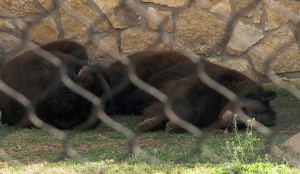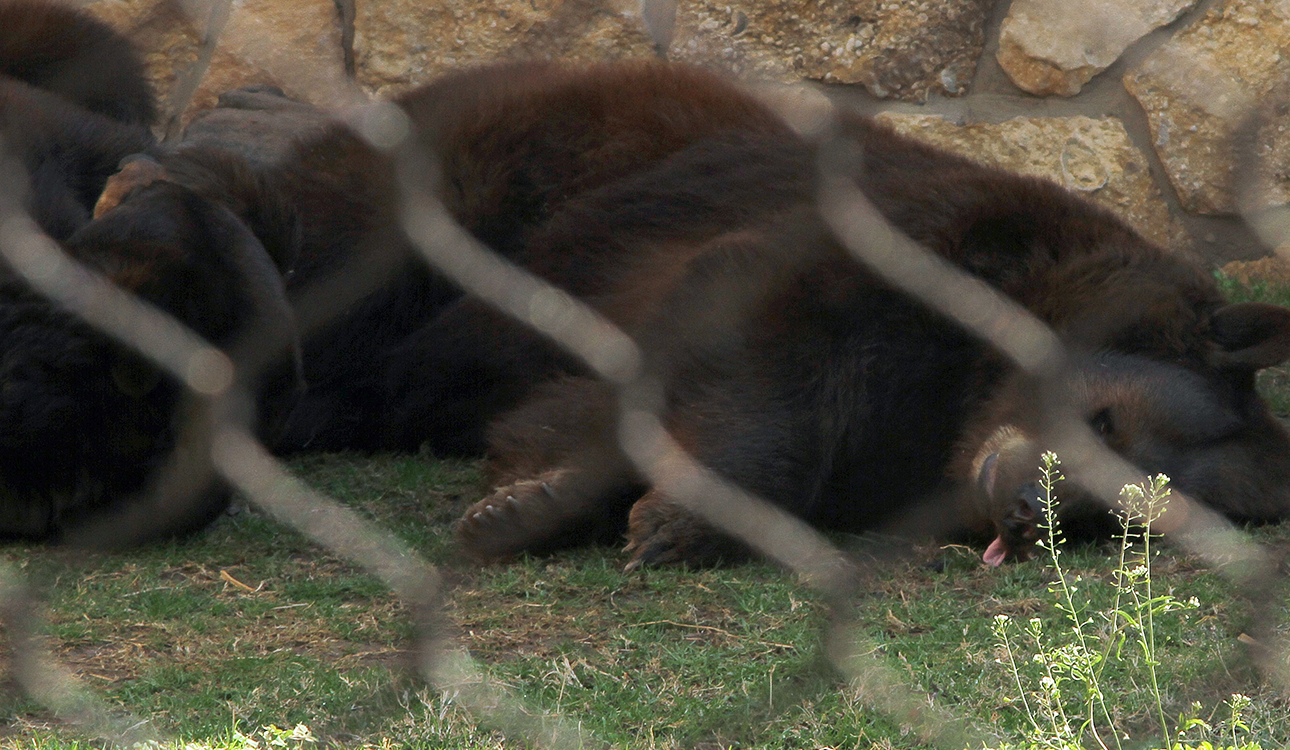
Travis Taylor | Lariat Photo Editor
Staff Writer
It takes a lot more to care for a North American black bear than water and a little sunlight.
Mascots Lady and Joy’s current habitat, the Bill & Eva Williams Bear Habitat, is a registered United States Department of Agriculture Class C zoo, though Baylor’s bear care hasn’t always met today’s care standards.
“Much of what we do as far as care for the bears is through the guidance of a professional bear trainer who acts a consultant for our program here at Baylor,” wrote David Hornbeak, media spokesman for the Baylor Live Bear Mascot Program, in an email to the Lariat. “He makes semi-annual visits to our program and helps us to learn the best, most effective ways to care for Lady and Joy.”
Hornbeak said the care for the bears has improved over the years and now the bears live comfortably.
“We have their interest at heart in all that we do,” he said. “This is why Lady and Joy have never had Dr Pepper. The high amount of sugar would be hard on their teeth and diet. Despite it being a beloved tradition, it is something that was discontinued. The bears have a great environment to live in and receive nothing but the best possible care.”
Lady and Joy receive the best exotic animal veterinary care in the state, Hornbeak said.
“At his most recent visit he found that Lady and Joy are in superb shape,” he said.
The Baylor bears often pace about their cage. Pacing can be a sign of boredom or discomfort. During Dr. David Garland’s 2008-2010 interim presidency at Baylor, PETA expressed concern on its website that the Baylor bears were pacing and “self-mutilating,” though it did not describe what it thought to be self-mutilation.
Manda Butler, animal care manager of mammals at Cameron Park Zoo, said animals expressing stereotypes of discontent are not always actually upset, though they can be.
“A lot of time the action is brought on by a stressor, or maybe a boredom response, but the thing about a stereotype is, once it’s ingrained behavior, it’s something they sometimes do and don’t even realize it,” Butler said. “It’s the equivalent of chewing your nails or twisting your hair, or if you tap your pen on the table. It’s a repetitive behavior that has no function or purpose, but because an animal is exhibiting a stereotype doesn’t mean that it is bored or stressed. It could, but animals are routine-oriented like we are.”
Eugene Baker, author of book on Baylor mascot history, “Here Come the Bears,” said in Baylor history there have been problems with the bears.
Some of the very first bears on campus in the early 20th century were tied to a tree instead of being kept in a pen or habitat. An unofficial bear mascot was even kept in a student’s backyard.
“The facility where we keep them is so much better than what it used to be in the past,” Baker said.
In the past, additional sugar was put into Dr Peppers that the bears were given to make the bear more interested in the drink, Baker said.
Baker’s book shows that bears were allowed around humans more, such as when they were taken to football games and allowed to be played with and be petted by students.
“There were some people who were disquieted by the fact that when we got rid of the bears, they were not well-treated by the people we gave them to,” Baker said. “And so we had to make sure that we had some type of arrangement by which they would be taken care of.”
Today Lady and Joy live in a habitat and will not be seen drinking Dr Pepper or attending football games.
The bears’ veterinarian helps design their diet.
“We do our very best to keep their nutrition as natural as possible,” Hornbeak said. “The main portion of their diet is a specially formulated food mix for omnivores. It is highly nutritious with just the right amounts of things like protein, iron and fiber.”
Lady and Joy are given fruit in the mornings and vegetables in the evening, as well as meat.
The Cameron Park Zoo also is home to North American black bears. These bears’ diets also consist of a special food made for bears, as well as other meats, fruits and vegetables, Butler said.
The Cameron Park Zoo website states enrichment, which is activities designed to stimulate an animal physically and mentally, is an important part of animal husbandry.
“Enrichment is a very important part of any captive animal management,” Butler said. “We really look at the species and look at what their wild time budget would be, and how much of their day they would spend foraging and doing other activities, and we try to mimic those as much as we can to keep the bears stimulated. The more natural of an environment, the closer you are to the wild time budget, the happier the animal is.”
Keepers at the zoo give their animals items and activities that would mimic natural behaviors, such as applying the scent of a different animal’s urine in order to cause the animal to re-mark its territory. Animals, the bear included, are given different objects to play with and food that has to be foraged.
Butler said she stresses the use of olfactory, or scent, stimulation.
“I think olfactory response is incredibly important to all animals,” she said.
Baylor bear keepers have their own methods of enrichment.
“The enrichment aspect of daily care is very important,” Hornbeak said. “This is one of the ways the bears get their exercise.”
For enrichment, Baylor bear keepers will scatter nuts and treats for the bears to seek out and find.
“The best form of enrichment for them is our training process,” Hornbeak said. “We have an off-campus secure training facility that is quite large and they have plenty of room to run around, wrestle with one another, or even climb hills and trees. Out there is where we work on new behaviors and really get them to work well with us.”
Hornbeak called Lady and Joy’s habitat “top-notch.”
“Care for the bears at Baylor has done nothing but improve over the years,” he said.






